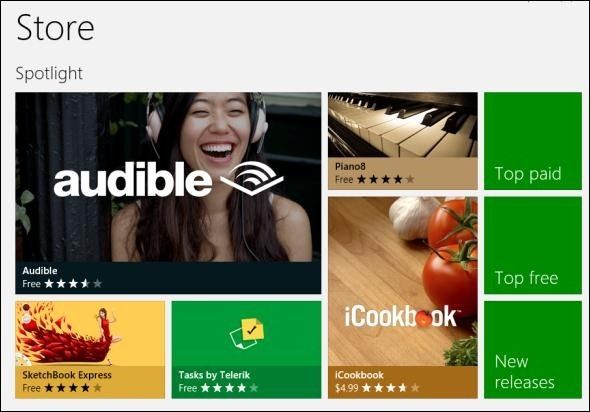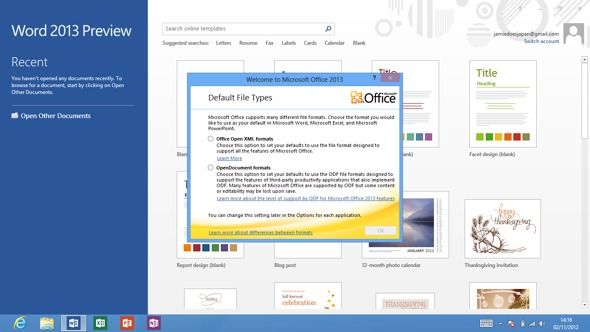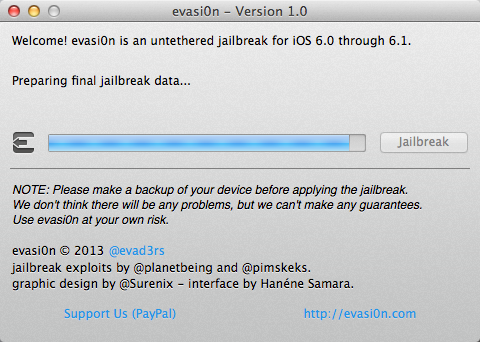Computers were once under our control. We could run any software we wanted on them, and the companies that manufactured the computer had no say. Today, computers are increasingly being locked down. Apple and Microsoft rule over their app stores with an iron fist, deciding what we can and can’t do with our devices. We live in a world where changing an iPad’s default web browser or email app is a crime.
This is an article about closed platforms and how they’re a plague upon the industry. This article isn’t just about Apple and their inconsistent censorship. It’s about Microsoft and how they’re phasing out the desktop in favor of the new “Modern” environment where apps can only be installed from their app store. It’s about carriers that block sideloading on Android phones, as AT&T once did. It’s about dangerous laws that make escaping these closed platforms a crime.
One Company-Controlled Store
Whether you’re using an iPhone, iPad, Windows 8 tablet, Windows RT machine, or Windows Phone, one thing is true: you can only get software for your device from an app store controlled by the company that makes your device. The company doesn’t allow just any software into their store – they have certain rules.
The problem isn’t restrictive app store rules, it’s locked-down platforms. When Microsoft or Apple block an app from their store, it means no one can actually use it.
Neither Microsoft, Apple, nor any other company that makes our devices should be the self-appointed arbiter of our morality. We should be able to freely choose the software we want to run and the content we want to view. They should be free to block things from their store, but we should also be able to go elsewhere and get them.
Games Can Be Art, Too
Apple, Microsoft, and every other purveyor of a closed platform decides what content is and is not appropriate for you. While Apple doesn’t censor books, music, or movies, apps are different. Apple censors apps that contain political content, satire created by Pulitzer-prize winners, games that challenge child labor policies in the smartphone industry as a whole [Broken URL Removed], and anything they just don’t like. “We view apps different than books or songs,” Apple’s guidelines state bluntly.
But games can be art, too. While the mainstream game industry is stuck in a rut, there are indie developers constantly pushing the boundaries of what is a game and what is art. On Apple’s iOS, developers have to self-censor. if they don’t censor themselves, their apps are refused.
Microsoft is doing the same thing. When Windows 8 was released, the Windows Store refused to include games that had a PEGI 16+ rating -- a category that includes games such as Skyrim. Microsoft had decided to prevent a large category of games from ever running in the Modern environment on Windows 8. Microsoft backed off on this restriction after taking a beating in the gaming press, but they tried to slip it past us. Is it any wonder that developers from Valve to Blizzard to Notch (creator of Minecraft) see Windows 8 as bad for PC gaming?
From the Smartphone to the Tablet to the Laptop
Apple bans competing web browsers from its iOS devices. You can get a competing browser, but it has to be a shell wrapped around Safari. It also can never become your default web browser. Imagine if Microsoft had this rule on Windows, years ago – only Internet Explorer 6 was allowed. Other web browsers were available, so long as they were just wrappers around Internet Explorer 6. The web as we know it would not exist – Firefox would never have been able to challenge Internet Explorer. After Microsoft stopped development on Internet Explorer, no one could have forced them to improve.
In other words: If Microsoft had the same restrictions on Windows as Apple did on iOS, Apple could have never released iTunes for Windows. Microsoft would have banned it.
Microsoft’s Windows RT shows us one possible path the future of Windows could take. The Windows RT desktop only allows applications written by Microsoft. The Modern environment only allows Microsoft-approved applications from the store – and no third-party web browsers are allowed. Windows RT devices also have locked boot loaders, so you can’t install any other operating system on them. They’re Windows RT-only, Internet Explorer-only, and Microsoft-approved software only.
This isn’t just a theoretical concern – we could have ARM-based laptops running Windows RT soon. As our own Angela wrote about her experience with Windows RT, "Despite the limitations, Windows RT is quite powerful and designed very well. It’s easy to see yourself using it on a regular basis to replace a laptop.” As ARM outcompetes Intel in power usage, Chromebooks ship with ARM chips, and Apple talks about using ARM in their Macs, the danger of Windows being locked up tight becomes more and more serious.
Even on Windows 8, the new “Modern” environment – the future of Windows – is restricted to only Microsoft-approved applications from the Windows Store. Microsoft has a strong interest in moving away from the Windows desktop and making everyone use Windows Store-based applications. That would give them a 30% cut for all software sales on Windows.
Windows Phone also doesn’t allow you to run apps that weren’t approved by Microsoft, just like Apple’s iPhone. Apple isn’t alone, and we shouldn’t just focus on Apple – they’ve set a bad example that other companies in the industry are following.
Why Jailbreaking Isn’t a Solution
Many people shrug off these concerns, saying jailbreaking is the solution. Jailbreaking just isn’t good enough, for several reasons:
- It took many months before a jailbreak for iOS 6 was created. Apple is trying their hardest to block jailbreaking, and they’re getting better at it.
- Many apps for jailbroken devices just don’t get made. While it would be possible for Google to write a native Google Chrome app for jailbroken devices, they never will. The market is too small and the risk of jailbreaks being blocked again is too high. The Surface RT has been jailbroken to run Windows desktop apps compiled for ARM, but only a few open-source applications are available – Adobe will never release Photoshop for jailbroken Windows RT systems.
- Jailbreaking voids the warranty of your device, so you’re out quite a bit of cash if the hardware fails. As newer devices get better at detecting jailbreaks, this will be more of a problem.
- Jailbreaking is a crime in many countries. This isn’t just an accident. Companies like Apple lobby to make jailbreaking a crime.
Controlling the Devices You Own Is a Crime
As if it wasn’t enough that manufacturers are locking these devices down, governments are stepping in to enforce the lock-down. In the United States, it’s legal to jailbreak a smartphone, but jailbreaking a tablet is a crime. In other words: jailbreaking your iPhone is fine, but jailbreaking your iPad makes you a criminal facing up to 5 years in jail or $500,000 in fines. If you don’t think the government would ever enforce these laws, take a look at the case of Aaron Schwartz, who committed suicide after the US government tried to nail him with a lifetime in jail for the crime of breaking a website’s terms of service. (Yes, breaking a website’s terms of service is also a crime in the United States.) Unlocking new cell phones just became illegal in the USA, too.
This isn’t just about the United States – Canada recently passed a law that makes any act of “breaking a digital lock” a crime. Jailbreaking an iPhone is a crime in Canada. International treaties like ACTA are pushing laws like this everywhere.
It’s not hard to imagine a future where all computing devices sold will be locked down. The RIAA already tried to make this happen back in 2002, with the proposed Consumer Broadband and Digital Television Promotion Act in the USA. The act would have banned any technology that could be used to view digital content without DRM. Every digital device would have been forced to include software designed to lock down the system and control what you can do with it. Penalties for violating this law would have been as high as 20 years in jail.
This would have been unworkable in an age when users had full control over their own computers, but it would now be very easy for laws to force Apple and Microsoft to include monitoring software in their devices. Governments could even pass a law forcing devices that connect to the Internet to pass certain checks, ensuring that only locked-down devices had access to the Internet. Just look at the war around SOPA – governments and large corporations will keep trying to lock down the Internet and control it.
In retrospect, Apple’s famous 1984 ad is sadly comical now that changing the default browser on an iPad is a crime.
Open Platforms
We already live in a world where more and more devices are increasingly locked down and installing your own software on them is a crime.
But all is not lost: Open platforms do exist. Android isn’t perfect, but it allows us to run the software we want without becoming criminals. (Even if Google removes an app from Google Play, you can download it from elsewhere and install it.) Microsoft hasn’t yet moved to lock down the Windows desktop the way they have with the new Modern interface and the desktop on Windows RT. Windows 8 is an open platform (the desktop) glued to a closed platform (the touch environment).
We need to support devices that keep us in control. We need to tell Microsoft that we want the future of Windows to be an open platform, just as the Windows desktop is today. We need to tell Apple that we want the ability to change our web browser and install games they may not approve of. We need to tell our governments that people should not be sent to jail for installing unapproved software on their own computers or breaking a website’s terms of service.
The Future
Apple makes amazing hardware, and the iPad is probably the best tablet out there – if only for its rich suite of apps, particularly content-creation apps that just aren’t there yet for Android tablets. Hybrid laptops that can seamlessly switch between laptop and tablet mode when necessary sound potentially awesome, if done right.
But I’ve drawn a line in the sand. I don’t want that iPad, with its criminal sanctions on doing anything Apple doesn’t approve of. I don’t want that Windows 8 machine, with its touch environment that’s locked down like an iPad. I don’t want to contribute to that future of computing that seems to be barreling down on us.
If every computer in the future is an iPad – or Microsoft's locked-down version of an iPad – we’ll have a serious problem.
What will we say in 50 years when our grandchildren ask us what we did when our computing freedom was taken away from us, given over to large corporations and governments? “I thought the iPhone was a bit nicer than the Nexus 4”?
Image Credit: Handcuffs on Laptop via Shutterstock, Comic via XKCD, Prisoner in Old Jail Cell via Shutterstock





